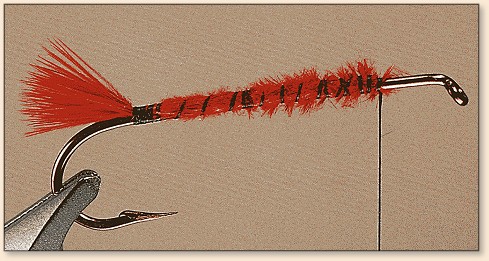Many of the same materials used in tailing
nymphs and wet flies are also used in tailing
streamers. The only thing to be careful about
is the length of the tail beyond the hook bend.
It's my belief that many of the standard streamer
patterns have what I call "eye wash" or decorative
tailing. For example, I've never seen anyone
tie or try to sell a Muddler minnow with no tail.
Yet, many years ago, Koke Winter and I spent time
fishing out of West Yellowstone with Bill Mason,
Bob Jacklin, and other now-famous guides and
tackle dealers. Bill Mason pinched the tails
off my Muddlers, saying, "They work a lot better
without them." That would be the last streamer
I'd have thought would need no tail. I've done
the same thing many times since, and it does seem
to make a difference. It pays to remember little
things like that.
The reason you should tie in a tail on a streamer
pattern is to add something to the fly to simulate
the anal vent on the minnow or food fish you're
trying to imitate. You should take a good look
at this area of the anatomy of the common (and
even some of the not-so-common) food fishes that
trout and bass like to eat. You'll soon discover
that no 2-inch minnow has an anal vent a full ½-inch
long. Once again, read all you can, examine all
the flies and naturals you can, and start asking
yourself some of the more obvious questions. My
personal theory is that a lot of tyers over the
years have been tying lots of flies in near-total
ignorance of what the natural really looks like,
and the too-long tails on streamers became a
tradition.

I tie the tail on most all of my personal streamers
very short - usually about the length of the hook
point to the barb. I use only orange or red yarn
and Marabou tufts. My short-tailed versions seem
to outfish the standard long-tailed versions of
the same patterns on a near two-to-one ratio.
I also carry a good selection of streamers with
no tails, just in case. ~ AK
Credits: This tying tip is from
Production Fly Flying, Second
Edition by A.K. Best, published by Pruett
Publishing Company, Boulder, Colorado. We
appreciate use permission.
Please check out the Fly Tying Section, on the Bulletin Board, here at FAOL too.
If you have any questions, tips, or techniques; send them to
publisher@flyanglersonline.com
|

